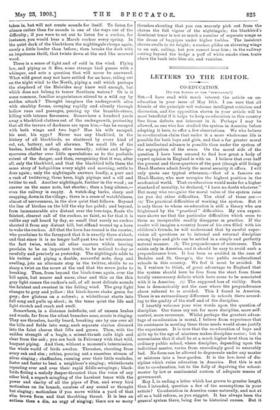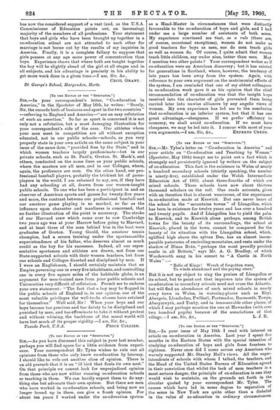LETTERS TO THE EDITOR.
CO-EDUCATION.
F'ro TILE Eurroit or TEM -SpacrAroft.-JI have read with much interest the article on co- education in your issue of May 16th. I am sure that all friends of the principle will welcome intelligent criticism and discussion, and the opposition shown in your article will be most beneficial if it helps to keep co-education in this country free from defects not inherent in it. Perhaps I may be allowed, as one who has studied the system in America before adopting it here, to offer a few observations. We who believe in co-education claim that under it a more wholesome life is possible for both boys and girls, and that a far greater moral and intellectual advance is possible than under the system of the segregation of the sexes. On the moral side of the question I have been amazed to find how great a body of expert opinion in England is with us. I believe that over half the present and three-quarters of the past (though still living) Head-Masters admit freely the moral security it offers. I will only quote one typical utterance,—that of a famous ex- Head-Master, who now occupies the highest position in the academical world. That co-education would make for a higher standard of morality, he declared, " I have no doubt whatever." But many who recognise the moral value of the system raise (as you do) other difficulties. The chief of these are :- (a) The practical difficulties of working the system. But it is only those to whom co-education is still a theory who are frightened by the "practical" difficulties. My own experi- ence shows me that the particular difficulties which seem to them so insuperable readily disappear in practice. If the reader will imagine a country house of his own filled with his children's friends, he will understand that by careful super- vision all questions as to internal and external discipline among boys and girls can be settled in a simple and perfectly natural manner. (b) The preponderance of mistresses. This exists only in America, and it should be easy to avoid such a preponderance here. It has been so avoided in the case of Bedales and St. George's, the two public co-educational schools in this country. We feel it must be avoided. It is, I venture to think, of great advantage to England that the system should here be free from the start from those totally unnecessary defects which have come to be associated with it in America. (c) The supposed loss of virility. Such loss is demonstrably not the case where the preponderance above referred to is avoided. This I found in America. There is an extraordinary difference in schools there accord. ing to the quality of the staff and of the discipline.
I heartily welcome your wise words upon the question of discipline. Our times cry out for more discipline, more self- control, more reverence. Whilst perhaps the greatest advan- tage of co-education is moral, I believe from experience that its assistance in meeting these three needs would alone justify the experiment. It is true that the co-education of boys and girls up to the age of nineteen makes discipline easier; but it necessitates that it shall be at a much higher level than in the ordinary public school, where discipline, depending upon the individual master, varies from exceedingly good to execrably bad. No form can be allowed to degenerate under any master or mistress into a bear-garden. It is the low. level of dis- cipline which ruins education in America. But this is not due to co-education, but to the folly of depriving the school- master by law or sentimental custom of adequate means of government. May I, in ending a letter which has grown to greater length than I intended, question a few of the assumptions in your article ? Co-education in America came naturally, and not at all as a bold reform, as you suggest. It has always been the general system there, being due to historical causes. But it has now the considered support of a vast (and, as the U.S.A. Commissioner of Education points out, an increasing) majority of the members of all professions. Your statement that boys and girls who have been brought up together in a co-education school are not attracted to each other for marriage is not borne out by the results of my inquiries in America. Finally, it is a complete fallacy to suppose that girls possess at any age more power of concentration than boys. Experience shows that where both are taught together the boy will be slightly ahead of the girl at all stages and in all subjects, and his advantage is precisely in his ability to get more work done in a given time.—I am, Sir, &c.,







































 Previous page
Previous page